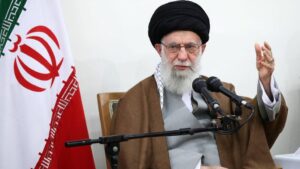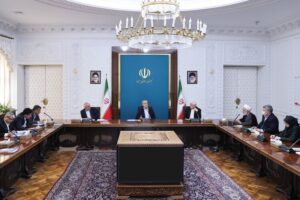Iran Rules Out Direct Talks with U.S., Citing ‘Maximum Pressure’ Strategy

Tehran, The Gulf Observer: Iranian Foreign Minister Abbas Araqchi has announced that Iran will not engage in direct negotiations with the United States for the time being, clarifying that the move is a tactic rather than a strategy. Speaking to khabaronline.ir, Araqchi emphasized that ongoing discussions with France, Germany, and Britain effectively serve as indirect negotiations with Washington over Iran’s nuclear program.
“To say that, as a strategy, we will not negotiate… that’s not how it is. We have negotiated many times [before], including very recently. Our ongoing talks with the three European countries are, in fact, something of an indirect negotiation,” Araqchi stated. He stressed that diplomatic relations often involve a choice between direct and indirect dialogue, and that, for now, indirect negotiations remain Iran’s chosen method.
Negotiation Amid ‘Maximum Pressure’
Referring to Leader of the Islamic Revolution Ayatollah Seyyed Ali Khamenei’s stance, Araqchi noted that rejecting talks under pressure from the United States was sensible and reasonable. He cited Washington’s withdrawal from the Joint Comprehensive Plan of Action (JCPOA) in 2018 and the subsequent reimposition of sanctions as grounds for Tehran’s cautious approach.
“In circumstances where there is ‘maximum pressure,’ no one in their sound mind would enter into direct talks,” Araqchi remarked. He pointed out that U.S. President Donald Trump’s decision to restore maximum pressure on Iran contradicted his claims of willingness to engage in diplomacy.
Changing Conditions Required for Direct Talks
Araqchi underscored that Iran’s stance against direct negotiations with the U.S. was not rooted in obstinacy but in historical experience and expert analysis. He asserted that under current conditions, with sanctions at their peak and pressure unrelenting, it would be unreasonable to pursue direct dialogue.
Future of the JCPOA
Reflecting on the 2015 nuclear deal, Araqchi admitted that the JCPOA, in its current form, cannot be revived. He noted that both Iran’s nuclear capabilities and U.S. sanctions had evolved significantly, making a return to the original agreement impractical. Nevertheless, he acknowledged that the JCPOA model could serve as a framework for future agreements, emphasizing Iran’s willingness to implement restrictions on nuclear activities for a defined period if a balanced and trustworthy agreement is achieved.
Araqchi concluded by reiterating Iran’s stance on the peaceful nature of its nuclear program, affirming the country’s readiness to build international trust through dialogue and measured commitments.


